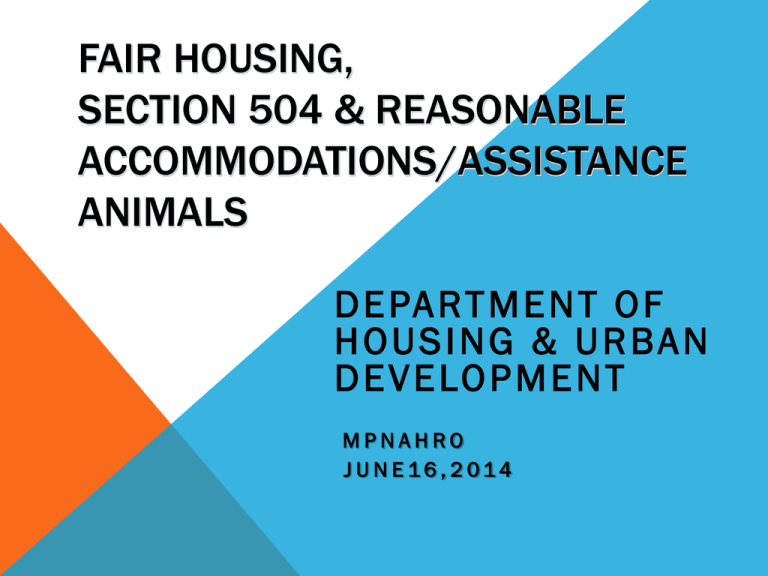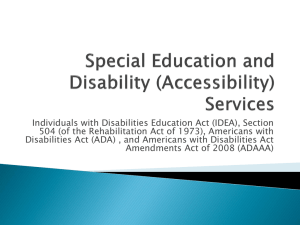
FAIR HOUSING,
SECTION 504 & REASONABLE
ACCOMMODATIONS/ASSISTANCE
ANIMALS
D E PA R T M E N T O F
HOUSING & URBAN
D E V E LO P M E N T
MPNAHRO
JUNE16,2014
FAIR HOUSING LAWS
• TITLE VI OF THE CIVIL RIGHTS ACT OF 1964
• FAIR HOUSING ACT OF 1968, AS AMENDED IN
1988
• SECTION 504 OF THE REHABILITATION ACT
OF 1973 (UFAS)
• THE AMERICANS WITH DISABILITIES ACT OF
1990 (ADA)
FAIR HOUSING ACT
PROTECTED CLASSES
RACE
COLOR
RELIGION
NATIONAL ORIGIN
SEX
FAMILIAL STATUS
DISABILITY
SECTION 504 OF THE
REHABILITATION ACT OF 1973
Found at 24 CFR Part 8.
Prohibits Discrimination on the basis of disability in programs
and activities receiving Federal Financial assistance from
HUD.
What Do You See?
DISCRIMINATION
Simply put, discrimination means treating
someone differently based on x, y or z.
REASONABLE ACCOMMODATIONS
&
REASONABLE MODIFICATIONS
DISCRIMINATION PROHIBITED
No qualified person with a disability shall, solely on
the basis of disability be excluded from
participation in, be denied the benefits of, or
otherwise be subjected to discrimination.
REASONABLE ACCOMMODATIONS
A reasonable accommodation is a change,
exception, or adjustment to a rule, policy,
practice, or service that may be necessary
for a person with a disability to have an
equal opportunity to use and enjoy a
dwelling, including public and common use
spaces.
EQUALITY OF BENEFITS &
OPPORTUNITY
Equalizes the benefit of housing
and enhances the quality of life
for persons with disabilities.
DEFINITION OF A PERSON WITH DISABILITY
• A person who has a physical or mental
impairment that substantially limits one or
more major life activity, has a record of
such an impairment, or is regarded as
having such impairment.
• Doesn’t include - Current drug use and
alcohol abuse.
EXAMPLES OF MAJOR LIFE ACTIVITIES
Seeing
Walking
Learning
Performing Manual Tasks
Hearing
Breathing
Speaking
Taking Care of One’s Self
COVERED DWELLINGS
Dwellings are defined under the Fair Housing Act as:
any building, structure which is intended for occupancy as a
residence by one or more families. The terms “dwelling” and
“dwelling units” has been broadly interpreted. (See 42 U.S.C. §
3602(b).
Many courts have determined the meaning to include temporary or
permanent dwelling place, which one intends to return.
U.S. v. City Rescue Mission of New Castle and James Henderson
U.S. VS. RESCUE MISSION OF NEW CASTLE
•
Mission (homeless shelter) did not allow a blind person to stay with their
service animal.
•
Mission denied him because they were not equipped to handle animals.
•
Discriminated on the following basis:
*Denial of dwelling based on disability
*Denial on different terms, conditions or privileges of rental
*Refusal to make accommodations when necessary to allow the
person to have equal opportunity to fully enjoy the dwelling
• Complainant attempted suicide
• Court awards damages and civil penalties
REQUESTING AN ACCOMMODATION
A reasonable accommodation must be
requested.
Requests can be made at any time, by person
with disability, family member or by someone else
who is acting on their behalf.
A request does not have to be in writing it can be
orally or by any other effective method.
Housing provider should place request in writing
and document outcome.
APPLYING THE PRINCIPLES …
An oral request is enough – A written request may not be
required.
The process should be quick and easy and should involve
determining the answers to two questions:
1.) Does the requester have a disability?
2.) Does the requester have a disability-related need for the
requested assistance animal?
Determinations should be made on a case-by-case basis.
EVALUATING REASONABLE
ACCOMMODATION REQUESTS
Housing providers must evaluate requests for
assistance animals as reasonable
accommodations by using the general principals
applicable to all reasonable accommodation
requests.
HOUSING PROVIDERS RESPONSIBILITY
Engaging in an interactive dialogue:
It is necessary, when an applicant or tenant requests
an accommodation or modification, to engage in an
interactive dialogue. One cannot simply refuse a
request for a reasonable accommodation or
modification. The interactive dialogue is an opportunity
to become educated about the requester’s needs and
to find an effective and reasonable solution for the
issue at hand.
VERIFYING A NEED FOR A
REASONABLE ACCOMMODATION
May request documentation– only to the extent necessary to verify that the
requester has a disability and whether the accommodation is needed for the
disability.
Apparent vs. Non-apparent disabilities.
May not acquire confidential medical records or inquire into the nature or
severity of a person’s disability.
Verification of a disability and need for an accommodation can be from a:
Medical provider; health Care provider; Doctor, a professional representing a
social service agency; a disability agency or rehab clinic; or other provider that
can verify the disability.
REASONABLE ACCOMMODATIONS
For an accommodation to be reasonable there must be an
identifiable relationship or nexus between the requested
accommodation and the individual’s disability.
WHAT IS REASONABLE?
The requested accommodation must be reasonable:
*It does not impose an undue financial and
administrative burden on the housing provider.
*It does not fundamentally alter the nature of the
housing provider’s operation.
Request for Assistance
Animal is a Reasonable
Accommodation under the
Fair Housing Act and
Section 504 of the
Rehabilitation Act of 1973
ASSISTANCE ANIMALS
Assistance animals are not pets.
Assistance animals include
service animals and emotional
support/therapy and comfort
animals.
ASSISTANCE ANIMALS …
Are animals that provide assistance, or perform tasks for the
benefit of a person with a disability, or provide emotional
support that alleviates one or more symptoms or effects of a
person’s disability.
Do not need to be trained or certified, serves a function for
person with disability to alleviate their disability.
Are not just dogs and may include cats, birds, guinea pigs,
miniature horses, capuchin monkeys, snakes, tarantulas, etc.
ASSISTANCE ANIMAL CONDITIONS
HOUSING PROVIDERS MAY NOT…
Charge a pet deposit or a fee
Deny access to housing or indoor and
outdoor public and common use areas
associated with housing
OR
Impose breed, weight, number, or size limitations.
ASSISTANCE ANIMAL CONDITIONS
Both Pet policies and No pet policies must clearly
state that the policy does not apply to assistance
animals.
HOUSING PROVIDERS…
May apply reasonable health and safety
concerns, including ensuring that animals are
not a threat or a nuisance.
May require owners to clean-up after animals
and maintain control of animals.
REMEDIES IF ANIMALS ARE A PROBLEM
Provide tenant with lease violations
Charge tenant for damages
Evict the tenant, not the animal
“SERVICE ANIMALS” UNDER
THE ADA
AMERICANS WITH DISABILITIES ACT APPLICATION
Title II of the ADA applies to public entities, including public
entities that provide housing (e.g. public housing agencies, state
and local government housing, housing provided at state
universities and other places of education.)
Title III of the ADA applies to places of public accommodation,
such as rental offices, shelters, some types of multifamily
housing, assisted living facilities, and housing at places of
education.
ADA DEFINITION OF A “SERVICE ANIMAL”
DOJ’s revised ADA regulations define “service animal” narrowly
as any dog that is individually trained to do work or perform tasks
for the benefit of an individual with a disability, including a
physical, sensory, psychiatric, intellectual, or other mental
disability.
In some cases, the ADA definition also includes miniature horses.
The provision of emotional support, well-being, comfort, or
companionship does not constitute work under this ADA
definition.
ADA INQUIRIES
The ADA has different requirements than the Fair
Housing Act.
Entities covered by the ADA may only make two inquiries to
assess requests under the ADA:
1.) “Is this a service animal that is required because of a disability?”
2.) “What work or tasks is the animal trained to perform?”
ADA INQUIRIES, CONT.
Covered entities may not ask about the “nature or
extent of a person’s disability.”
Covered entities may not require documentation or
proof.
Covered entities may not ask the two questions if it is
“readily apparent that the animal is trained to do work
or perform tasks for a person with a disability.”
(EXAMPLE: A dog seen guiding a person with a visual
impairment)
NEW DEPARMENT OF JUSTICE ADA REGULATIONS
Recent Amendments to ADA
regulations do not affect
reasonable accommodation
requests under the Fair Housing
Act and Section 504.
ADA NOT APPLICABLE IN HOUSING
Under the Fair Housing Act and Section 504,
individuals with disabilities may request reasonable
accommodations for assistance animals , including
all animals, not just dogs or miniature horses.
Housing providers must meet broader Fair Housing
Act/Section 504 standard in deciding whether to
grant reasonable accommodation requests for
assistance animals.
VISITING ASSISTANCE ANIMALS
Housing providers must allow visiting animals.
• In Reno, NV, a housing provider was charged with repeated
harassment and attempted eviction of a couple who had a
friend visit with service animal.
• The tenant provided the landlord with documentation
showing the friend’s dog was a service animal. But the
landlord would not make an exception to the property’s
“no pet” policy. After the eviction was dismissed in court,
the landlord continued to harass the tenant by posting
signs by tenants door.
Quiz
REASONABLE ACCOMMODATIONS
QUIZ
1.
Is there a limit on the number of reasonable accommodation
requests a person with a disability may have?
2.
Do verifications of a disability and a need for a reasonable
accommodation have to be from a licensed Doctor?
3.
Can a request be turned down if there is not a nexus between
the type of disability and the requested accommodation?
REASONABLE ACCOMMODATIONS
QUIZ
4. Can a housing provider deny leasing to a
person with a disability if they do not have
any accessible
5. Does a housing provider have to approve a
request for maintenance to take a person
with a disabilities garbage out ? What are
some alternatives?
REASONABLE ACCOMMODATION
QUIZ
6.
Can the housing provider require a tenant to move into
an accessible unit when one is available if the disabled
tenant is currently in an non-accessible unit?
7.
Can housing providers charge a tenant with a disability
to transfer to an accessible unit from a unit that is not
accessible?
ASSISTANCE ANIMAL QUIZ
1. Can you limit the number, breed, size, or weight of an
assistance animal?
2. Can you deny an Assistance animal if it is not trained
or certified?
3. Can you require the tenant to request another
reasonable accommodation if they acquire a
different animal?
4. Can you evict an Assistance Animal?
ASSISTANCE ANIMAL
QUIZ
5. Can a housing provider require a tenant to acquire
rental insurance due to their assistance animal?
6. Can a housing provider require a tenant to have
their assistance animal spayed or neutered?
7. How often can a housing provider verify a
reasonable accommodation request?
TO FILE A FAIR HOUSING COMPLAINT
File a fair housing complaint by using HUD’s On
Line Form accessible through our Web site
http:www.hud.gov
File by calling toll free in Denver
1-800-877-7353
File by calling a FHIP or a FHAP in your area
MORE INFORMATION
FHEO Notice 2013-01, Service Animals and Assistance
Animals for People with Disabilities in Housing and HUDFunded Programs,
http://portal.hud.gov/hudportal/documents/huddoc?id=s
ervanimals_ntcfheo2013-01.pdf
U.S. Department of Housing and Urban Development and U.S.
Department of Justice: Joint Statement on Reasonable
Accommodations under the Fair Housing Act,
www.hud.gov/offices/fheo/library/huddojstatement.pdf
DOJ ADA Technical Assistance on Service Animals
http://www.ada.gov/service_animals_2010.htm
REMEDIES FOR DISCRIMINATION
ACTUAL ECONOMIC DAMAGES
COMPENSATION FOR PAIN AND SUFFERING AND NONECONOMIC INJURY
ATTORNEYS FEES
CIVIL PENALTIES
PUNITIVE DAMAGES
FAIR HOUSING:
It’s Not an Option
Its the Law!
QUESTIONS?
For more information, contact:
Michele Hutchins, Equal Opportunity Specialist
Office of Fair Housing & Equal Opportunity
Utah State HUD Office
125 S. State Street, Room 3001
Salt Lake City, UT 84138
(801) 524-6097-Direct line
(801) 524-6909-TDD/TTY line
1-800-877-7353 – Denver Toll Free
email: michele.hutchins@hud.gov









